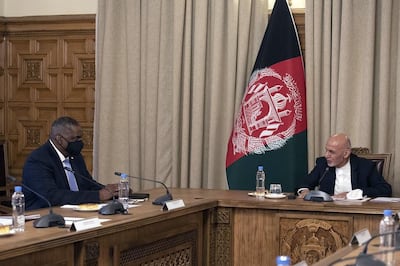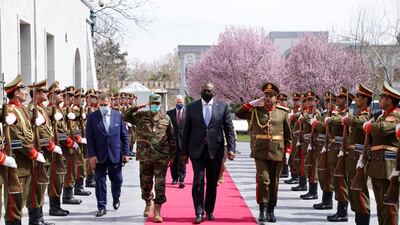US Secretary of Defence Lloyd Austin arrived in Kabul on Sunday for his first trip to Afghanistan as Pentagon chief, amid swirling questions about how long American troops will remain in the country.
Mr Austin was received by Gen Scott Miller, commander of US forces in Afghanistan, and Afghan defence officials. He later met Afghan President Ashraf Ghani.
“We are truly grateful for the continued support you provided to our troops that have worked here alongside Afghans for so long, and also our diplomats,” Mr Austin told Mr Ghani in a brief video of the meeting shared with the media.
In a statement issued on social media, Mr Austin said the meeting was to help in an ongoing review of the US presence in Afghanistan.
"I came to Afghanistan to listen and learn. This visit been very helpful for me, and it will inform my participation in the review we are undergoing here," he said.
But Mr Austin would not be drawn on a date for US forces to leave the country.
"In terms of setting a specific date for withdrawal, that's the domain of my boss," he said, referring to US President Joe Biden.
A similar statement shared by the Afghan presidential palace said Mr Austin praised the sacrifices of the Afghan security forces in the fight against terrorism. "Both sides expressed concern about the escalation of violence in the country," it said.
The trip comes at a time when the US is accelerating efforts to end the deadlock in the intra-Afghan peace negotiations and reach a deal between the warring parties.
Earlier last month, US Secretary of State Antony Blinken wrote to Mr Ghani urging swift action on reaching a deal with the Taliban.
The letter warned the Afghan leader that the US may consider withdrawing troops on the May 1 deadline, set in a deal the US made with the Taliban during the administration of former president Donald Trump.
A 'Peace Government'
US special envoy Zalmay Khalilzad shared an eight-page peace proposal, which the Afghan government and the Taliban are reviewing. This calls for an interim "peace government" that would shepherd Afghanistan toward constitutional reform and elections.
While exact details of Mr Austin's visit have not been shared, many experts speculate the purpose is to further discuss the peace government with the Afghan president.
But a senior Afghan security official told The National that the Afghan government is unlikely to accept a US-brokered government.
“They won’t accept an interim set-up,” the official said. “But it might be open to offering [the Taliban] other power-sharing mechanisms. But that too, only when the Taliban exercise willingness to give up on violence.”
Despite the promise of a reduction in violence in exchange for US troops leaving the country, the Taliban have ramped up attacks in Afghanistan in the past year.

The Afghan Independent Human Rights Commission documented 2,250 civilian assassinations in 2020, an increase of 169 per cent on the previous year. The Taliban have also failed to break their alliance with the Al Qaeda, and continue to shelter their fighters, according to Afghan intelligence officials.
The increase in violence and a lack of mechanism to appraise the existing deal with the Taliban has prompted the current US administration to review its policies and plan for withdrawal.
In February, Mr Austin told the reporters the US "will not undertake a hasty or disorderly withdrawal from Afghanistan that puts their forces or the alliance's reputation at risk".
The US wants the Afghan government and the Taliban to reach a political agreement before withdrawing its troops, Said Saber Ibrahimi, Afghan analyst and fellow at New York University Center on International Co-operation think tank, told The National.
“This is partly because the US wants to ensure that its counter-terrorism and political interests are served after the departure,” he said
He added that there was also a likely prospect of a civil war if the US withdrew without a strong government in place.
“A failed state in Afghanistan could mean more terrorism in the region and beyond,” Mr Ibrahimi said.
President Joe Mr Biden has mooted an extension of a US troop presence past the deadline, to continue support to the Afghan government. He told ABC News on Monday that the May 1 withdrawal "could happen, but it is tough".
In response, the Taliban on Friday warned of consequences if the US does not meet the deadline.
“At this stage, it appears that the US may seek to extend the May 1 deadline. Perhaps for six months or so, not more than that,” Mr Ibrahimi said.
“However, this is not to say that the US will wait indefinitely for Afghans to reach an agreement. The US may run out of patience and withdraw altogether if there is no progress on the talks.”














